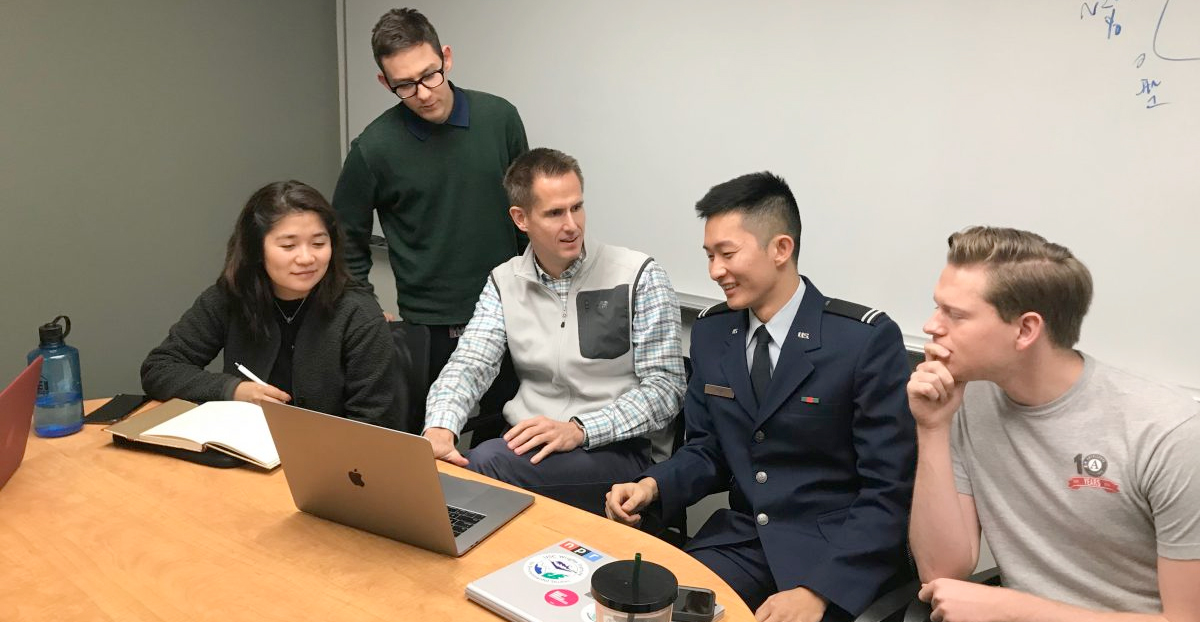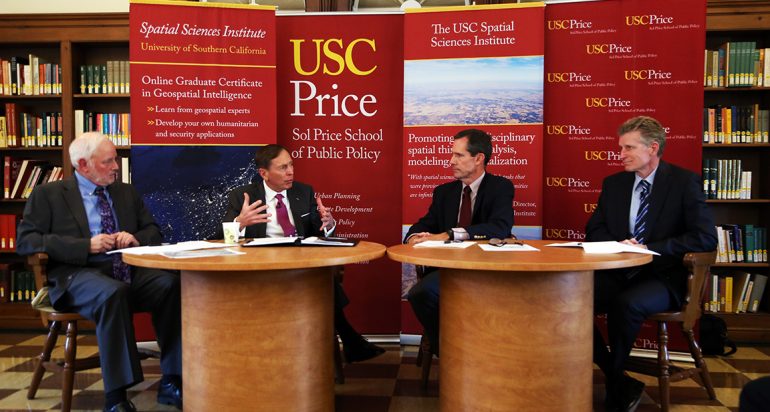(L-R) Professor Steven Lamy, GEN [R] David Petraeus, COL [R] Professor Steven D. Fleming, and Professor Michael Orosz discuss human security and geospatial science challenges and opportunities.
Innovative major completes spectrum of SSI’s HSGI academic programs
Interested in career paths in humanitarian response and relief, global human rights, international border conflicts, public health emergencies, global environmental risks and refugee migration and crisis management? USC undergraduates can now obtain a B.S. in Human Security and Geospatial Intelligence (HSGI) offered by the Spatial Sciences Institute.
Career Opportunities
This interdisciplinary major in the USC Dornsife College of Letters, Arts and Sciences emphasizes critical thinking, geospatial reasoning and analytical techniques – foundational skills that provide decision makers with informed recommendations and strategies to address human security challenges.
COL [R] Steven D. Fleming, professor of the practice of spatial sciences and the USC Institute for Creative Technologies, explained, “We can see in our current events, such as the COVID-19 pandemic and the ramifications of extreme and changing weather conditions, that it is critically important to understand the phenomena that impact the well-being of individuals as well as society at large. Individuals with a HSGI background can contribute to the creation, gathering and analysis of geospatial data to provide solutions that stabilize and improve the human condition.”
Another lead faculty member in the B.S. HSGI program is Andrew J. Marx, Ph.D., associate professor of the practice of spatial sciences and the USC Institute for Creative Technologies. Marx served as a foreign affairs analyst with the U.S. Air Force and the U.S. Department of State. He noted, “There are tremendous career opportunities for individuals in human security and geospatial intelligence (GEOINT) work. Those interested in work with global policy organizations, international NGOs or agencies at the federal, state and local levels, such as the U.S. Departments of State, Health and Human Services, Interior and Defense, will find this is an ideal major.”
Opportunities for ROTC Cadets and Veterans
Additionally, this major has been designed to support the academic programs of ROTC cadets at USC and veterans seeking to undertake or complete their undergraduate education. USC, through its Spatial Sciences Institute, is unique in being the only U.S. university offering this undergraduate degree program outside of one of the military service academies. Shahla Fatemi, who directs USC’s Military and Veterans Initiatives, said, “This major provides our ROTC cadets with a wonderful opportunity to align their undergraduate studies in preparation for their leadership roles in service. And I am so excited that our veteran students can capitalize on their military service as they intermingle that experience with their undergraduate studies here at USC.”
Curriculum
The curriculum of this HSGI bachelor’s program includes courses from international relations, political science and urban planning, which complement the courses in spatial sciences. The courses in spatial sciences include a course in spatial data collection using drones and the HSGI capstone course. “The HSGI capstone course is a practicum in which students will develop a set of recommended solutions to a real-world human security and geospatial intelligence issue,” Fleming explained.
He emphasized, “With this new academic program, USC is unique in offering a minor and major in HSGI for undergraduates, and for graduate students, a graduate certificate in GEOINT and an M.S. in HSGI. If you think of an academic path as a highway, the Spatial Sciences Institute offers multiple ‘on ramps’ and ‘off ramps’ in GEOINT education. A USC student can combine an HSGI minor or a major here with studies in many other fields. Then they can segue into our GEOINT graduate certificate or M.S. in HSGI, or also springboard into a job or graduate studies at another institution. Veterans, active duty service members or those who have served in entry-level GEOINT and HSGI positions are ideal candidates for our graduate programs.”
“The University of Southern California Spatial Sciences Institute has been a leader in developing academic programs in human security and geospatial intelligence,” said Camelia Kantor, Ph.D., vice president of academic affairs of the United States Geospatial Intelligence Foundation (USGIF). USGIF has accredited the SSI GEOINT graduate certificate and the M.S. in HSGI, the first degree of its kind to achieve USGIF accreditation. Fleming indicated that the Institute is seeking USGIF accreditation for this new bachelor’s degree in the 2020-2021 academic year.
Meet an HSGI major
Eric Allen is the inaugural Human Security and Geospatial Intelligence major at USC.
As an HSGI major, Allen is learning how nations react during times of crisis, so he can contribute to ways to efficiently and effectively establish harmony and safety in regions impacted by crisis.
“My number one goal in life is to make a positive impact during crisis events. The B.S. in Human Security and Geospatial Intelligence provides me with the ability to reach my goal,” said Allen. A USC track star, Allen hopes to compete professionally in track and field and pursue career opportunities in intelligence or disaster recovery.
Research Opportunities
Allen join other USC Spatial Sciences Institute students who undertaken HSGI studies as minors in Human Security and Geospatial Intelligence. Past HSGI students have conducted research in SSI’s Human Security and Geospatial Intelligence Lab, co-directed by Fleming and Marx. Additional research opportunities are with SSI’s affiliated faculty and units across the university, including the USC Institute for Creative Technologies, and with visiting scholars and research collaborators with entities such as the U.S. Army Corps of Engineers and the Naval Postgraduate School.

Student researchers in the Spatial Sciences Institute Human Security and Geospatial Intelligence Lab gather with Dr. Andrew J. Marx to discuss their work. Team members have included (L-R) Mia Poynor, Richard Windisch (standing), Dr. Marx, Jong Su Kim, and Garrett Nance.
Past HSGI students have published their work in peer-reviewed journals, presented posters and talks at national and international conferences, and have won prestigious awards and fellowships, such as Fulbright and Boren scholarships.
In addition to Fleming, who has more than 30 years of remote sensing and military experience, and Marx, an expert in remote sensing and international public policy, other lead HSGI faculty include:
Jason T. Knowles, Ph.D., adjunct associate professor of the practice of spatial sciences and CEO and founder of GeoAcuity, a geospatial consulting firm that specializes in providing high quality geographic information systems (GIS), remote sensing, and geospatial intelligence (GEOINT) solutions to the environmental, municipal and Federal sectors;
Steven Lamy, Ph.D., professor of international relations and spatial sciences and an expert in foreign policy analysis and human security;
Ryan McAlinden, senior advisor, Synthetic Training Environment (STE) Cross Functional Team (CFT) for the Army Futures Command and an adjunct assistant professor of the practice of spatial sciences with the USC Spatial Sciences Institute;
Michael Orosz, Ph.D., research associate professor of civil and environmental engineering and spatial sciences and an expert in homeland security; and
Gregory F. Treverton, Ph.D., professor of the practice of international relations and spatial sciences and former chairman of the National Intelligence Council.
Progressive Degree Path
The B.S. in Human Security and Geospatial Intelligence degree can serve as a progressive degree path to obtaining a USC masters degree with the baccalaureate degree in just five years. Progressive degree pathways are available into SSI’s M.S. in Geographic Information Science and Technology, M.S. in Human Security and Geospatial Intelligence, M.S. in Spatial Data Science, and M.S. in Spatial Economics and Data Analysis. Other progressive degree pathways also are possible; please email Ken Watson, SSI academic programs director, at watsonke@usc.edu.
Learn More
Email COL [R] Steven D. Fleming, Ph.D., professor of the practice of spatial sciences and the Institute for Creative Technologies, at s.fleming@usc.edu or email Ken Watson, SSI academic programs director, at watsonke@usc.edu to find out more about the advantages of being a HSGI student at USC.




